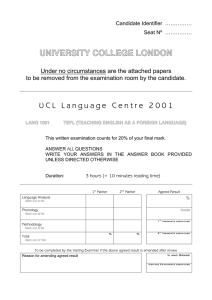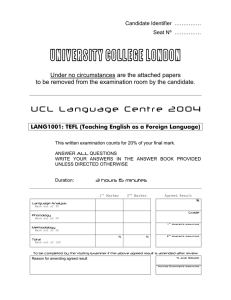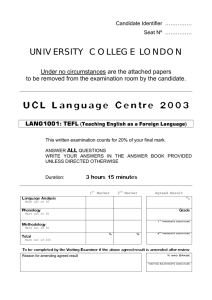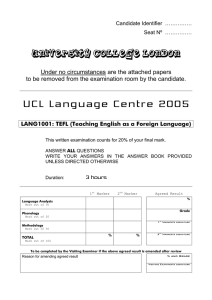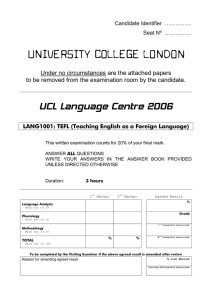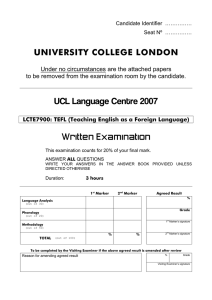UNIVERSITY COLLEGE LONDON
advertisement
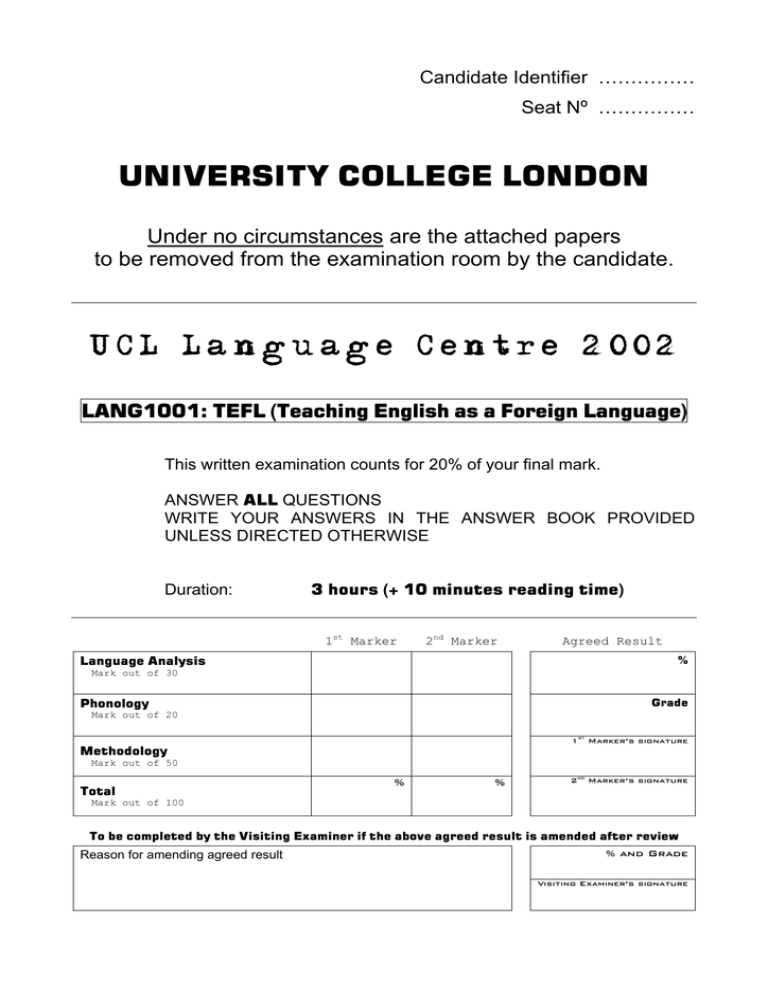
Candidate Identifier …………… Seat Nº …………… UNIVERSITY COLLEGE LONDON Under no circumstances are the attached papers to be removed from the examination room by the candidate. UCL Language Centre 2002 LANG1001: TEFL (Teaching English as a Foreign Language) This written examination counts for 20% of your final mark. ANSWER ALL QUESTIONS WRITE YOUR ANSWERS IN THE ANSWER BOOK PROVIDED UNLESS DIRECTED OTHERWISE Duration: 3 hours (+ 10 minutes reading time) 1st Marker 2nd Marker Agreed Result % Language Analysis Mark out of 30 Grade Phonology Mark out of 20 1st Marker’s signature Methodology Mark out of 50 Total % % 2nd Marker’s signature Mark out of 100 To be completed by the Visiting Examiner if the above agreed result is amended after review Reason for amending agreed result % and Grade Visiting Examiner’s signature TEACHING ENGLISH AS A FOREIGN LANGUAGE – LANG 1001 SECTION 1 LANGUAGE ANALYSIS Page 1 65 Minutes In this section you can obtain a maximum of 30 points. Answer all questions in the answer booklet provided. Note form is acceptable for this section. 1. Read this conversation. Unfortunately, Luisa and Stefan make some mistakes. Find the mistakes, correct them and explain why they are wrong. There are 11 mistakes, including the example. The example has been done for you. Luisa: Hi. Can I speak to Stefan? Stefan: Hello Luisa. I am (1) Stefan. How are you? L: Oh exhausted! I try to finish our assignment for Friday but I can’t find my notes. Can I lend yours? S: Which one? L: The ones on ‘Presenting Langage’. S: I’ll must check that I’ve got them. Yes, here they are. L: Oh wonderful. Are you coming in college today? S: Yes, I should be there by one. Why we don’t meet in the union bar and have a lunch? I can give them to you then. L: Yes, that’s a good idea. By the way, had you spoken to Joe last night? S: No. Why? L: He’s won a free flight to the States! S: He’s the luckier guy in the world. He’s always winning competitions. Wasn’t it Joe which won that holiday to the Caribbean last year? L: Yes, I think it was. Well, I must go. See you at one. Bye. S: Bye. (1) EXAMPLE. CORRECT FORM: It should be ’This is Stefan'. We use ‘this is’ when we introduce ourselves on the phone. (10 points) TURN OVER TEACHING ENGLISH AS A FOREIGN LANGUAGE – LANG 1001 SECTION 1 2. Page 2 (continued) (a) Look at the conversation below. Identify and name the FOUR ways that are used to talk about condition. (b) Give a brief description of each of their uses in this passage. (c) Write 2 concept questions for each form identified. (d) Explain 1 main problem that students can have with the FORM and 1 problem that they can have with PRONUNCIATION of each form. (e) At what level would you introduce each conditional form for the first time? Why? A: I think we should go shopping now. B: Why? A: Well, if we go now, it won’t be so busy. B: Ha! You said that last Saturday and it was awful. A: Well, I need to take these curtains back – they aren’t wide enough. B: If you’d measured the window properly in the first place, you’d have bought the right size. A: True but I didn’t! If you were more interested in decorating, it would help. B: Well I’m not. I hate it! A: You should have thought of that before we bought this old house. B: I know! If we’d bought that newly converted flat that I liked, I wouldn’t have to go shopping now! (15 points) TURN OVER TEACHING ENGLISH AS A FOREIGN LANGUAGE – LANG 1001 SECTION 1 3. Page 3 (continued) What does each of the following groups of words have in common and what problems of form, meaning and pronunciation could they cause learners? (a) employee, employment, unemployed, misemployed. (b) suggest, insist, refuse, persuade. (5 points) TURN OVER TEACHING ENGLISH AS A FOREIGN LANGUAGE – LANG 1001 SECTION 2 PHONOLOGY Page 4 25 Minutes In this section you can obtain a maximum of 20 points. 1. Connected Speech (a) Mark the following dialogue for LINKING ONLY. WRITE ON THE DIALOGUE ITSELF. EXAMPLE: A How was your N outing to N Oxford today? B Awful! We arrived at the station to learn that the excursion train we were travelling on was delayed. A No! Not again! It’s always the same at weekends! B I know. Then there were no extra coaches, so when the train arrived we had to stand all the way! A Hmm. Not a good start. B No, Sonia and Rupert, my grandchildren, were with me, so I had to console them with cola and crisps. (5 points) TURN OVER TEACHING ENGLISH AS A FOREIGN LANGUAGE – LANG 1001 SECTION 2 Page 5 (continued) Assimilation eg standby / 0stæmbaI / and ten minutes / te0mInIts / is one feature of connected speech in English. (b) Name FIVE other features of connected speech in English and identify TWO examples of each feature in the following dialogue. NB: Do not give more than 2 examples for each feature as only the first 2 will be accepted. Sentence stress and intonation are not included in this question. WRITE ON THE DIALOGUE ITSELF. A There’s such a lot of rubbish for the dump. Could you help me with it? B Depends what help you’re looking for. Is tomorrow okay? A They’re threatening to strike tomorrow. B Are you sure? Why don’t you phone to check? I’ve got lots to see to. A Okay then. (10 points) TURN OVER TEACHING ENGLISH AS A FOREIGN LANGUAGE – LANG 1001 SECTION 2 2. Page 6 (continued) Sounds (a) Transcribe the following individual words into phonemic script. Mark the stress. teenagers (b) juvenile What PRONUNCIATION problems might learners have with these words? (5 points) TURN OVER TEACHING ENGLISH AS A FOREIGN LANGUAGE – LANG 1001 SECTION 3 METHODOLOGY Page 7 90 Minutes In this section you can obtain a maximum of 50 points. Answer ALL questions. 1. You have a group of UPPER INTERMEDIATE learners who need to revise and practise the present continuous for the future, and the future continuous. You decide to use the enclosed listening material as the basis for your lesson. How would you use the material to revise this language area and give oral and written practice? There are ten learners in the class and the lesson is SIXTY MINUTES. Include a BRIEF lesson plan. (20 points) 2. Your learners (INTERMEDIATE) have asked to learn vocabulary for CRIME (for example, dropping litter, mugging, theft) and WEDDINGS/SOCIAL CUSTOMS (for example, reception, bride, presents). (a) Choose ONE of these lexical areas and list the items you would teach. (b) Describe how you would teach them and provide sufficient oral practice in a FORTY MINUTE lesson. Include a BRIEF lesson plan. (15 points) 3. Read the statements below. Choose TWO of them and BRIEFLY discuss them. examples to illustrate your ideas. (a) In what ways can you use songs to help learners? (b) How can the teacher’s role vary during the different stages of a lesson? (c) How can a teacher maximise learner participation in a lesson? (d) How can you check learner understanding when presenting grammar? Use (15 points) TURN OVER TEACHING ENGLISH AS A FOREIGN LANGUAGE – LANG 1001 SECTION 3 Page 8 (continued) Blueprint Upper Intermediate, Brian Abbs and Ingrid Freebairn Longman 1993 END OF PAPER
